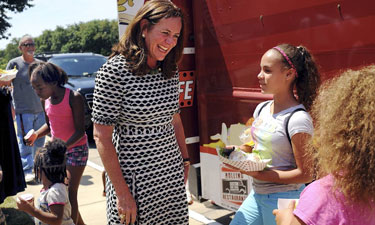 Each day, park and recreation agencies work to fight childhood hunger. Earlier this year with support from the Walmart Foundation, NRPA awarded funding to 80 park and recreation agencies to help provide summer meals, creating significant impacts across the country.
Each day, park and recreation agencies work to fight childhood hunger. Earlier this year with support from the Walmart Foundation, NRPA awarded funding to 80 park and recreation agencies to help provide summer meals, creating significant impacts across the country.
When the bell rings signaling the start of summer vacation, most kids are jumping for joy. Summer is the time for fun and for summer camps featuring full days of games, field trips, swimming pools, dodgeball, festivals, music, hiking, enrichment classes, sports and more. While these activities alone are enough for most kids to have an awesome summer, not everyone shares the same excitement.
School’s Out, Now What?
During the school year, more than 21 million children rely on access to free and reduced-price school breakfasts and lunches each day. In the summer months, only 3.2 million of these children actually receive meals. This is a huge gap that park and recreation agencies are helping to fill. As the largest public provider of out-of-school-time meals, park and recreation agencies are feeding hungry children in low-income and underserved communities. This summer, thousands of park and recreation sites opened up their doors for camp programming and to operate the USDA Summer Food Service Program (SFSP). From the large urban agencies in cities like Dallas, Texas and Chicago, Illinois, to smaller, rural sites in Fredericksburg, Virginia and Tuskegee, Alabama — agencies helped to ensure that children all over the country were fed a healthy and nutritious meal.
In Dallas, the city faces a number of challenges. Pockets within diverse areas are poverty-stricken — with fast-food restaurants present on almost every street and a large number of food deserts, limiting healthy and affordable food options for low-income families. The City of Dallas Park and Recreation Department helps to address one of these challenges by serving more than 650,000 meals each year during summer and in before/after-school programming. In addition to providing meals for all children enrolled in its summer camp programs, the City of Dallas allows any child under the age of 18 to come in for a healthy meal. While this puts more pressure on the agency to maintain accurate number counts, the city feels strongly that the health and well-being of children in its community is a top priority.
The Chicago Park District, in another large urban setting, also took steps this year to expand its Summer Food Service Program. It has a great relationship with its food vendor that allows it to have a part in menu planning. Not only can park and recreation staff members help select the food that is served to the children, but they can also gather and provide feedback from the children on the meals that are served. In accordance with their recent pledge to implement the Healthy Eating Physical Activity (HEPA) standards, they are able to request that non-fat and low-fat dairy products, whole grains, fresh fruits and vegetables, and healthier protein options are served. The high-quality food helps to ensure that children are receiving nutrient-rich foods and keeps them coming back for more.
Meaningful Impacts
While the larger urban agencies boast greater numbers of meals served, hundreds of smaller park and recreation agencies are also creating meaningful impacts. With 18.6 percent of its population falling below the poverty level, the City of Fredericksburg, Virginia, works with the school system to provide meals across this community. The city operates a mobile food truck that travels to four locations throughout its 10.5 square miles. This service provides free meals for any child that approaches the food truck, and any adult (age 18 and older) can purchase a meal for $3. With a population of 30,000 residents, the city estimates that almost 300 children per day are fed healthy meals through this service.
The City of Tuskegee, Alabama, is working with its school system to provide meals during the summer months. Census data from 2013 shows that out of Tuskegee’s 9,000 residents, 30 percent are living below the poverty line with a median income of $26,848. In this community, families constantly struggle to know where the next meal is coming from while figuring out how to pay bills each month and provide health insurance. Working with the Macon County Board of Education, the Tuskegee Park and Recreation Department is helping to alleviate one of those concerns for families in the summertime.
Summer should be a time for fun, and all children, no matter where they come from or where they live, should have access to their neighborhood swimming pool and a game of dodgeball without having to worry about where their next meal is coming from. Park and recreation agencies implementing the Summer Food Service Program help to ensure that this is a reality for millions of children across the country.
As reauthorization for this and other critical federal nutrition programs is up for renewal this year, it is important that Congress continue to fund these programs that benefit millions of children. Check out NRPA’s Open Space blog for the latest update on the Child Nutrition Reauthorization bill.
Allison Colman is NRPA’s Program Manager.

